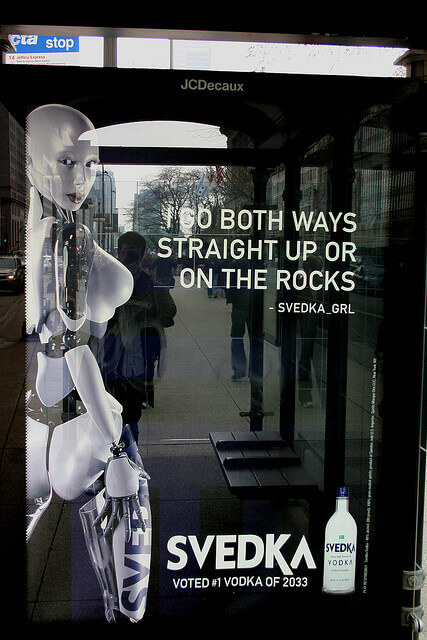Marketing Xenosexuality: Women and the Sex Robot Taboo?
xenosexual: one who exhibits sexual desire for that which is strange, foreign or alien.
It’s the quintessential “stranger than fiction” story – pleasurable, normal, acceptable sex with a machine… What could be more taboo now that the future of robotic possibilities is so vast and available for the active imagination to embrace?
How can we tell that our culture is moving from one of fear about android companions to one of taboo and tacit acceptance? The answer is in the advertising.

Image Source: Aaron Krager on Flickr
This is the first time we’ve discussed the bold marketing move by Svedka brand vodka, and they aren’t the first to use images of advanced technologies to sell products. But they have made a clear decision here to transition from the typical “hot women sell booze” marketing methods by placing the function of sex-selling squarely on the shoulders of an admittedly stronger and more malleable candidate – the fictional fembot. Of course, fembots aren’t likely to be fictional for much longer. What does this say about not just the future of sex appeal, but the future of marketing?

Image Source: swanksalot on Flickr
These ads do indeed send mixed messages. Should we? Or shouldn’t we? The sexy robot, breaking out past the dying trend of the emaciated and photoshopped prepubescent body, is the new razor’s edge of taboo. Her body may be made of metal, but her curves are all woman. We are supposed to see her as beautiful and attractive, sensual with the sleek lines of both an adult human body and the metallic glean of a fancy new car. In many ways, she is a step up from the over-sexualized and under-fed forms of unrelenting youth that populate runways and photo sets.
Men with a fetish for sex robots may still be seen as strange and anti-social, but our cultural standards and views on the matter are changing. The robot taboo is being challenged not just in underground magazines, sex shows and internet chat rooms, but in the light of day and under public scrutiny. This is where acceptance comes, in the streets and in our media.
The message explains that we should be turned on by the future, by the possibilities and their endlessness. But they also reek of the same cultural stereotypes of women that we have been fighting against for decades, that of the binary sexual nature. Society tells women that there are only two “ways” to “swing” and only two “messages” to “send” – yes, or no. Do sex robots ever say no?
Will the advances in robotic sexuality allow human men and women to move beyond these constricting ideas of gender, sexuality, and consent in their own relationships?
Or will the love of robots simply widen the divide between us in all our human relationships?
Leave a reply
You must be logged in to post a comment.

















